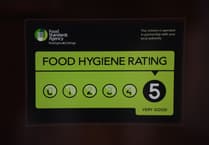An ambulance took two hours to attend a 90-year-old woman who had fallen and hit her head.
Debbie, who asked us only to use her first name, from Loddiswell, had completed a basic first aid course in June and was confronted with having to use the skills she had learnt while she was enjoying a pub lunch.
Debbie had visited the Loddiswell Inn for Sunday lunch when a 90-year-old woman lost her balance in front of her and fell backwards off the steps in the pub, hitting her head.
“She was bleeding and had walnut sized bumps on her head”, Debbie explained, “we called the ambulance, but, although its not the paramedics’ fault, it took two hours to arrive.”?Debbie was laid on the floor of the pub with the elderly woman for those two hours, keeping pressure on the wound on her head, keeping her comfortable and trying to keep her spirits up while they waited.
“The back of her head was covered in blood”, Debbie continued, “I went through six bar towels trying to stem the bleeding. Her heart was racing and occasionally missing a beat, but she was more upset it’d ruined her perm she’d had just had done, and not being able to eat her Sunday roast!”?Debbie said that while the pub staff were brilliant, the wait for the ambulance was worrying, and she was “so thankful” that she had done the first aid training that enabled her to help when the elderly and frail woman fell right in front of her.
The patient was eventually taken to Derriford by ambulance where she received nine stitches and was finally discharged and returned to her home late on Wednesday, November 27, three days later. Friends and neighbours have rallied around to make sure she is OK.
Debbie added: “The whole experience has made me want to do further first aid courses. If we have to wait for so long for an ambulance in our rural areas, due to the cutbacks, the more people who can acquire the skills, the better for us all.”
An open letter written by members of the South West Ambulance Service Trust staff in November called for the Chief Executive Ken Wenman to resign due to cuts in the service.
The letter is in three parts, addressed to the public, their family and friends and to SWAST. The section to the public reads: “We’re sorry for not getting to you or your loved ones quick enough because there are just not enough of us or we are called out to answer non-emergency calls.
“We’re sorry for the patient and family members that have been left on the floor for hours as a consequence of not getting to you on time.
“We’re sorry when you remain in the ambulance or in the hospital corridor for hours when we are stacked at A&E’s because we can’t complete our hand over.
“We’re sorry that our employer is so poor in managing their resources that they are potentially putting your family at risk.
“We’re sorry you sometimes feel the need to verbally abuse or physically threaten us while we treat your family and friends.
“We’re sorry it appears that SWAST deployments and performance targets are more important than patient care.
“We’re sorry if we arrive at your emergency at the end of a 12 hour shift and possible overrun if we are so tired we potentially fear making a wrong clinical decision.”





Comments
This article has no comments yet. Be the first to leave a comment.